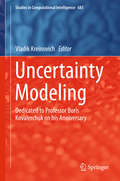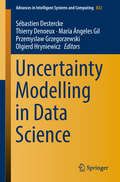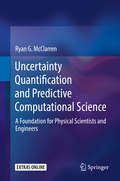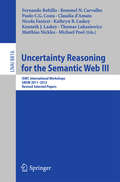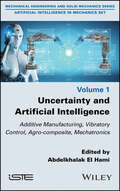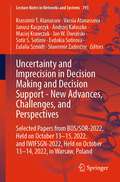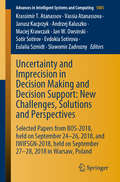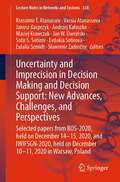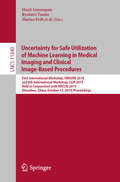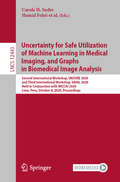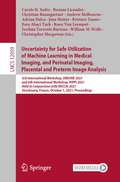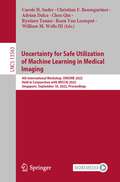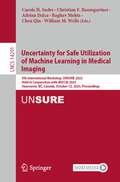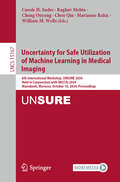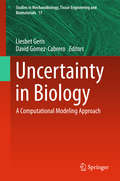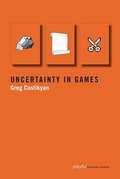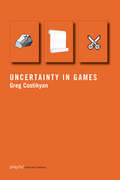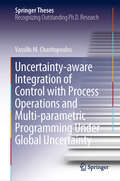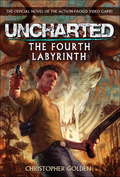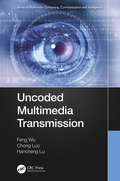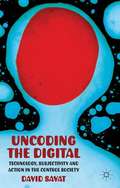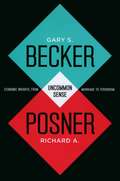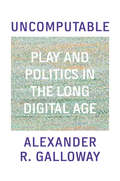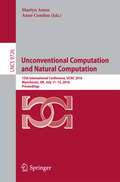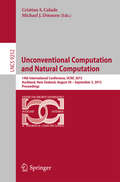- Table View
- List View
Uncertainty Modeling
by Vladik KreinovichThis book commemorates the 65th birthday of Dr. Boris Kovalerchuk, and reflects many of the research areas covered by his work. It focuses on data processing under uncertainty, especially fuzzy data processing, when uncertainty comes from the imprecision of expert opinions. The book includes 17 authoritative contributions by leading experts.
Uncertainty Modelling in Data Science (Advances in Intelligent Systems and Computing #832)
by Sébastien Destercke Thierry Denoeux María Ángeles Gil Olgierd Hryniewicz Przemyslaw GrzegorzewskiThis book features 29 peer-reviewed papers presented at the 9th International Conference on Soft Methods in Probability and Statistics (SMPS 2018), which was held in conjunction with the 5th International Conference on Belief Functions (BELIEF 2018) in Compiègne, France on September 17–21, 2018. It includes foundational, methodological and applied contributions on topics as varied as imprecise data handling, linguistic summaries, model coherence, imprecise Markov chains, and robust optimisation. These proceedings were produced using EasyChair.Over recent decades, interest in extensions and alternatives to probability and statistics has increased significantly in diverse areas, including decision-making, data mining and machine learning, and optimisation. This interest stems from the need to enrich existing models, in order to include different facets of uncertainty, like ignorance, vagueness, randomness, conflict or imprecision. Frameworks such as rough sets, fuzzy sets, fuzzy random variables, random sets, belief functions, possibility theory, imprecise probabilities, lower previsions, and desirable gambles all share this goal, but have emerged from different needs.The advances, results and tools presented in this book are important in the ubiquitous and fast-growing fields of data science, machine learning and artificial intelligence. Indeed, an important aspect of some of the learned predictive models is the trust placed in them. Modelling the uncertainty associated with the data and the models carefully and with principled methods is one of the means of increasing this trust, as the model will then be able to distinguish between reliable and less reliable predictions. In addition, extensions such as fuzzy sets can be explicitly designed to provide interpretable predictive models, facilitating user interaction and increasing trust.
Uncertainty Quantification and Predictive Computational Science: A Foundation for Physical Scientists and Engineers
by Ryan G. McClarrenThis textbook teaches the essential background and skills for understanding and quantifying uncertainties in a computational simulation, and for predicting the behavior of a system under those uncertainties. It addresses a critical knowledge gap in the widespread adoption of simulation in high-consequence decision-making throughout the engineering and physical sciences. Constructing sophisticated techniques for prediction from basic building blocks, the book first reviews the fundamentals that underpin later topics of the book including probability, sampling, and Bayesian statistics. Part II focuses on applying Local Sensitivity Analysis to apportion uncertainty in the model outputs to sources of uncertainty in its inputs. Part III demonstrates techniques for quantifying the impact of parametric uncertainties on a problem, specifically how input uncertainties affect outputs. The final section covers techniques for applying uncertainty quantification to make predictions under uncertainty, including treatment of epistemic uncertainties. It presents the theory and practice of predicting the behavior of a system based on the aggregation of data from simulation, theory, and experiment. The text focuses on simulations based on the solution of systems of partial differential equations and includes in-depth coverage of Monte Carlo methods, basic design of computer experiments, as well as regularized statistical techniques. Code references, in python, appear throughout the text and online as executable code, enabling readers to perform the analysis under discussion. Worked examples from realistic, model problems help readers understand the mechanics of applying the methods. Each chapter ends with several assignable problems. Uncertainty Quantification and Predictive Computational Science fills the growing need for a classroom text for senior undergraduate and early-career graduate students in the engineering and physical sciences and supports independent study by researchers and professionals who must include uncertainty quantification and predictive science in the simulations they develop and/or perform.
Uncertainty Reasoning for the Semantic Web III
by Fernando Bobillo Rommel N. Carvalho Paulo C. G. Costa Claudia D'Amato Nicola Fanizzi Kathryn B. Laskey Kenneth J. Laskey Thomas Lukasiewicz Matthias Nickles Michael PoolThis book contains revised and significantly extended versions of selected papers from three workshops on Uncertainty Reasoning for the Semantic Web (URSW), held at the International Semantic Web Conferences (ISWC) in 2011, 2012, and 2013. The 16 papers presented were carefully reviewed and selected from numerous submissions. The papers included in this volume are organized in topical sections on probabilistic and Dempster-Shafer models, fuzzy and possibilistic models, inductive reasoning and machine learning, and hybrid approaches.
Uncertainty and Artificial Intelligence: Additive Manufacturing, Vibratory Control, Agro-composite, Mechatronics
by Abdelkhalak El HamiToday's information technology, along with Artificial Intelligence (AI), is moving towards total communication between all computerized systems. AI is a representation of human intelligence based on the creation and application of algorithms in specific computer environments. Its aim is to enable computers to act like human beings. For it to work, this type of technology requires computer systems, data with management systems and advanced algorithms, used by AI. In mechanical engineering, AI can offer many possibilities: in mechanical construction, predictive maintenance, plant monitoring, robotics, additive manufacturing, materials, vibration control and agro composites, among many others. This book is dedicated to Artificial Intelligence uncertainties in mechanical problems. Each chapter clearly sets out used and developed illustrative examples. Aimed at students, Uncertainty and Artificial Intelligence is also a valuable resource for practicing engineers and research lecturers.
Uncertainty and Imprecision in Decision Making and Decision Support - New Advances, Challenges, and Perspectives: Selected Papers from BOS/SOR-2022, Held on October 13-15, 2022, and IWIFSGN-2022, Held on October 13-14, 2022, in Warsaw, Poland (Lecture Notes in Networks and Systems #793)
by Krassimir T. Atanassov Janusz Kacprzyk Sławomir Zadrożny Jan W. Owsiński Maciej Krawczak Evdokia Sotirova Eulalia Szmidt Andrzej Kałuszko Vassia Atanassova Sotir S. SotirovThis volume is composed of selected papers from two conferences held in Warsaw, Poland on October 13-15, 2022: the BOS/SOR’2022 - National Conference on Operational and Systems Research, one of premiere conferences in the field of operational and systems research, and the Twentith International Workshop on Intuitionistic Fuzzy Sets and Generalized Nets, IWIFSGN-2022, one of premiere conferences on fuzzy logic, notably on extensions of the traditional fuzzy sets, also comprising a considerable part on the Generalized Nets (GNs). A joint publication of selected papers from the two conferences follows a long tradition of such a joint organization, and – from a substantial point of view – combines systems modeling, systems analysis, broadly perceived operational research, notably optimization, decision making and decision support, with various aspects of uncertain and imprecise information and their related tools and techniques.
Uncertainty and Imprecision in Decision Making and Decision Support: Selected Papers from BOS-2018, held on September 24-26, 2018, and IWIFSGN-2018, held on September 27-28, 2018 in Warsaw, Poland (Advances in Intelligent Systems and Computing #1081)
by Krassimir T. Atanassov Janusz Kacprzyk Sotir Sotirov Maciej Krawczak Evdokia Sotirova Eulalia Szmidt Vassia Atanassova Andrzej Kaluszko Jan W. Owsinski Slawomir ZadroznyThis book gathers selected papers from two important conferences held on October 24–28, 2018, in Warsaw, Poland: theFifteenth National Conference of Operational and Systems Research, BOS-2018, one of the leading conferences in the field of operational and systems research not only in Poland but also at the European level; andthe Seventeenth International Workshop on Intuitionistic Fuzzy Sets and General Nets, IWIFSGN-2018, one of thepremiere conferences on fuzzy logic.The papers presented here constitute a fair and comprehensive representation of the topics covered by both BOS-2018 and IWIFSGN-2018, includingextensions of the traditional fuzzy sets, in particular on the intuitionistic fuzzy sets, as well as other topics in uncertainty and imprecision modeling, the Generalized Nets (GNs), a powerful extension of the traditional Petri net paradigm, and InterCriteria Analysis, a new method for feature selection and analyses in multicriteria and multi-attribute decision-making problems. The Workshop was dedicated to the memory of Professor Beloslav Riečan (1936–2018), a regular participant at the IWIFSGN workshops.
Uncertainty and Imprecision in Decision Making and Decision Support: Selected papers from BOS-2020, held on December 14-15, 2020, and IWIFSGN-2020, held on December 10-11, 2020 in Warsaw, Poland (Lecture Notes in Networks and Systems #338)
by Krassimir T. Atanassov Janusz Kacprzyk Sławomir Zadrożny Jan W. Owsiński Maciej Krawczak Evdokia Sotirova Eulalia Szmidt Andrzej Kałuszko Vassia Atanassova Sotir S. SotirovThis book is composed of selected papers from the Sixteenth National Conference on Operational and Systems Research, BOS-2020, held on December 14-15, 2020, one of premiere conferences in the field of operational and systems research. The second is the Nineteenth International Workshop on Intuitionistic Fuzzy Sets and Generalized Nets, IWIFSGN 2020, held on December 10-11, 2020, in Warsaw, Poland, in turn—one of premiere conferences on fuzzy logic, notably on extensions of the traditional fuzzy sets, also comprising a considerable part on the generalized nets (GNs), an important extension of the traditional Petri nets. A joint publication of selected papers from the two conferences follows a long tradition of such a joint organization and—from a substantial point of view—combines systems modeling, systems analysis, broadly perceived operational research, notably optimization, decision making, and decision support, with various aspects of uncertain and imprecise information and their related tools and techniques.
Uncertainty for Safe Utilization of Machine Learning in Medical Imaging and Clinical Image-Based Procedures: First International Workshop, UNSURE 2019, and 8th International Workshop, CLIP 2019, Held in Conjunction with MICCAI 2019, Shenzhen, China, October 17, 2019, Proceedings (Lecture Notes in Computer Science #11840)
by Cristina Oyarzun Laura Raj Shekhar Stefan Wesarg Miguel Ángel González Ballester Klaus Drechsler Marius Erdt Marius George Linguraru Christian Baumgartner Tal Arbel Hayit Greenspan Adrian Dalca William M. Wells Ryutaro Tanno Carole H. SudreThis book constitutes the refereed proceedings of the First International Workshop on Uncertainty for Safe Utilization of Machine Learning in Medical Imaging, UNSURE 2019, and the 8th International Workshop on Clinical Image-Based Procedures, CLIP 2019, held in conjunction with MICCAI 2019, in Shenzhen, China, in October 2019. For UNSURE 2019, 8 papers from 15 submissions were accepted for publication. They focus on developing awareness and encouraging research in the field of uncertainty modelling to enable safe implementation of machine learning tools in the clinical world. CLIP 2019 accepted 11 papers from the 15 submissions received. The workshops provides a forum for work centred on specific clinical applications, including techniques and procedures based on comprehensive clinical image and other data.
Uncertainty for Safe Utilization of Machine Learning in Medical Imaging, and Graphs in Biomedical Image Analysis: Second International Workshop, UNSURE 2020, and Third International Workshop, GRAIL 2020, Held in Conjunction with MICCAI 2020, Lima, Peru, October 8, 2020, Proceedings (Lecture Notes in Computer Science #12443)
by Tal Arbel Enzo Ferrante Sarah Parisot Aristeidis Sotiras Adrian Dalca Bartlomiej Papiez William M. Wells Ryutaro Tanno Carole H. Sudre Hamid Fehri Christian F. Baumgartner Koen Van LeemputThis book constitutes the refereed proceedings of the Second International Workshop on Uncertainty for Safe Utilization of Machine Learning in Medical Imaging, UNSURE 2020, and the Third International Workshop on Graphs in Biomedical Image Analysis, GRAIL 2020, held in conjunction with MICCAI 2020, in Lima, Peru, in October 2020. The workshops were held virtually due to the COVID-19 pandemic.For UNSURE 2020, 10 papers from 18 submissions were accepted for publication. They focus on developing awareness and encouraging research in the field of uncertainty modelling to enable safe implementation of machine learning tools in the clinical world. GRAIL 2020 accepted 10 papers from the 12 submissions received. The workshop aims to bring together scientists that use and develop graph-based models for the analysis of biomedical images and to encourage the exploration of graph-based models for difficult clinical problems within a variety of biomedical imaging contexts.
Uncertainty for Safe Utilization of Machine Learning in Medical Imaging, and Perinatal Imaging, Placental and Preterm Image Analysis: 3rd International Workshop, UNSURE 2021, and 6th International Workshop, PIPPI 2021, Held in Conjunction with MICCAI 2021, Strasbourg, France, October 1, 2021, Proceedings (Lecture Notes in Computer Science #12959)
by Christopher Macgowan Christian Baumgartner Andrew Melbourne Adrian Dalca Roxane Licandro William M. Wells Ryutaro Tanno Carole H. Sudre Jana Hutter Esra Abaci Turk Koen Van Leemput Jordina Torrents BarrenaThis book constitutes the refereed proceedings of the Third Second International Workshop on Uncertainty for Safe Utilization of Machine Learning in Medical Imaging, UNSURE 2021, and the 6th International Workshop on Preterm, Perinatal and Paediatric Image Analysis, PIPPI 2021, held in conjunction with MICCAI 2021. The conference was planned to take place in Strasbourg, France, but was held virtually due to the COVID-19 pandemic.For UNSURE 2021, 13 papers from 18 submissions were accepted for publication. They focus on developing awareness and encouraging research in the field of uncertainty modelling to enable safe implementation of machine learning tools in the clinical world. PIPPI 2021 accepted 14 papers from the 18 submissions received. The workshop aims to bring together methods and experience from researchers and authors working on these younger cohorts and provides a forum for the open discussion of advanced image analysis approaches focused on the analysis of growth and development in the fetal, infant and paediatric period.
Uncertainty for Safe Utilization of Machine Learning in Medical Imaging: 4th International Workshop, UNSURE 2022, Held in Conjunction with MICCAI 2022, Singapore, September 18, 2022, Proceedings (Lecture Notes in Computer Science #13563)
by William M. Wells III Adrian Dalca Ryutaro Tanno Carole H. Sudre Christian F. Baumgartner Koen Van Leemput Chen QinThis book constitutes the refereed proceedings of the Fourth Workshop on Uncertainty for Safe Utilization of Machine Learning in Medical Imaging, UNSURE 2022, held in conjunction with MICCAI 2022. The conference was hybrid event held from Singapore. For this workshop, 13 papers from 22 submissions were accepted for publication. They focus on developing awareness and encouraging research in the field of uncertainty modelling to enable safe implementation of machine learning tools in the clinical world.
Uncertainty for Safe Utilization of Machine Learning in Medical Imaging: 5th International Workshop, UNSURE 2023, Held in Conjunction with MICCAI 2023, Vancouver, BC, Canada, October 12, 2023, Proceedings (Lecture Notes in Computer Science #14291)
by Adrian Dalca William M. Wells Carole H. Sudre Christian F. Baumgartner Chen Qin Raghav MehtaThis book constitutes the refereed proceedings of the 5th Workshop on Uncertainty for Safe Utilization of Machine Learning in Medical Imaging, UNSURE 2023, held in conjunction with MICCAI 2023 in Vancouver, Canada, in October 2023. For this workshop, 21 papers from 32 submissions were accepted for publication. The accepted papers cover the fields of uncertainty estimation and modeling, as well as out of distribution management, domain shift robustness, Bayesian deep learning and uncertainty calibration.
Uncertainty for Safe Utilization of Machine Learning in Medical Imaging: 6th International Workshop, UNSURE 2024, Held in Conjunction with MICCAI 2024, Marrakesh, Morocco, October 10, 2024, Proceedings (Lecture Notes in Computer Science #15167)
by William M. Wells Carole H. Sudre Chen Qin Raghav Mehta Cheng Ouyang Marianne RakicThis book constitutes the refereed proceedings of the 6th Workshop on Uncertainty for Safe Utilization of Machine Learning in Medical Imaging, UNSURE 2024, held in conjunction with MICCAI 2024, Marrakesh, Morocco, on October 10, 2024. The 20 full papers presented in this book were carefully reviewed and selected from 28 submissions. They are organized in the following topical sections: annotation uncertainty; clinical implementation of uncertainty modelling and risk management in clinical pipelines; out of distribution and domain shift identification and management; uncertainty modelling and estimation.
Uncertainty in Biology
by Liesbet Geris David Gomez-CabreroComputational modeling allows to reduce, refine and replace animal experimentation as well as to translate findings obtained in these experiments to the human background. However these biomedical problems are inherently complex with a myriad of influencing factors, which strongly complicates the model building and validation process. This book wants to address four main issues related to the building and validation of computational models of biomedical processes: 1. Modeling establishment under uncertainty 2. Model selection and parameter fitting 3. Sensitivity analysis and model adaptation 4. Model predictions under uncertainty In each of the abovementioned areas, the book discusses a number of key-techniques by means of a general theoretical description followed by one or more practical examples. This book is intended for graduate students and researchers active in the field of computational modeling of biomedical processes who seek to acquaint themselves with the different ways in which to study the parameter space of their model as well as its overall behavior.
Uncertainty in Games
by Greg CostikyanIn life, uncertainty surrounds us. Things that we thought were good for us turn outto be bad for us (and vice versa); people we thought we knew well behave in mysterious ways; thestock market takes a nosedive. Thanks to an inexplicable optimism, most of the time we are fairlycheerful about it all. But we do devote much effort to managing and ameliorating uncertainty. Is itany wonder, then, asks Greg Costikyan, that we have taken this aspect of our lives and transformedit culturally, making a series of elaborate constructs that subject us to uncertainty but in afictive and nonthreatening way? That is: we create games. In this concise and entertaining book,Costikyan, an award-winning game designer, argues that games require uncertainty to hold ourinterest, and that the struggle to master uncertainty is central to their appeal. Game designers, hesuggests, can harness the idea of uncertainty to guide their work. Costikyan explores the manysources of uncertainty in many sorts of games -- from Super Mario Bros. toRock/Paper/Scissors, from Monopoly toCityVille, from FPS Deathmatch play to Chess. He describestypes of uncertainty, including performative uncertainty, analytic complexity, and narrativeanticipation. And he suggest ways that game designers who want to craft novel game experiences canuse an understanding of game uncertainty in its many forms to improve their designs.
Uncertainty in Games (Playful Thinking)
by Greg CostikyanHow uncertainty in games—from Super Mario Bros. to Rock/Paper/Scissors—engages players and shapes play experiences. In life, uncertainty surrounds us. Things that we thought were good for us turn out to be bad for us (and vice versa); people we thought we knew well behave in mysterious ways; the stock market takes a nosedive. Thanks to an inexplicable optimism, most of the time we are fairly cheerful about it all. But we do devote much effort to managing and ameliorating uncertainty. Is it any wonder, then, asks Greg Costikyan, that we have taken this aspect of our lives and transformed it culturally, making a series of elaborate constructs that subject us to uncertainty but in a fictive and nonthreatening way? That is: we create games.In this concise and entertaining book, Costikyan, an award-winning game designer, argues that games require uncertainty to hold our interest, and that the struggle to master uncertainty is central to their appeal. Game designers, he suggests, can harness the idea of uncertainty to guide their work.Costikyan explores the many sources of uncertainty in many sorts of games—from Super Mario Bros. to Rock/Paper/Scissors, from Monopoly to CityVille, from FPS Deathmatch play to Chess. He describes types of uncertainty, including performative uncertainty, analytic complexity, and narrative anticipation. And he suggest ways that game designers who want to craft novel game experiences can use an understanding of game uncertainty in its many forms to improve their designs.
Uncertainty-aware Integration of Control with Process Operations and Multi-parametric Programming Under Global Uncertainty (Springer Theses)
by Vassilis M. CharitopoulosThis book introduces models and methodologies that can be employed towards making the Industry 4.0 vision a reality within the process industries, and at the same time investigates the impact of uncertainties in such highly integrated settings. Advances in computing power along with the widespread availability of data have led process industries to consider a new paradigm for automated and more efficient operations. The book presents a theoretically proven optimal solution to multi-parametric linear and mixed-integer linear programs and efficient solutions to problems such as process scheduling and design under global uncertainty. It also proposes a systematic framework for the uncertainty-aware integration of planning, scheduling and control, based on the judicious coupling of reactive and proactive methods. Using these developments, the book demonstrates how the integration of different decision-making layers and their simultaneous optimisation can enhance industrial process operations and their economic resilience in the face of uncertainty.
Uncharted: The Fourth Labyrinth
by Christopher GoldenThe official novel of Naughty Dog's award-winning videogame franchise! In the ancient world there was a myth about a king, a treasure, and a hellish labyrinth. Now the doors to that hell are open once again. Nathan Drake, treasure hunter and risk taker, has been called to New York City by the man who taught him everything about the "antiquities acquisition business." Victor Sullivan needs Drake's help. Sully's old friend, a world-famous archaeologist, has just been found murdered in Manhattan. Dodging assassins, Drake, Sully, and the dead man's daughter, Jada Hzujak, race from New York to underground excavations in Egypt and Greece. Their goal: to unravel an ancient myth of alchemy, look for three long-lost labyrinths, and find the astonishing discovery that got Jada's father killed. It appears that a fourth labyrinth was built in another land and another culture--and within it lies a key to unmatched wealth and power. An army of terrifying lost warriors guards this underground maze. So does a monster. And what lies beyond--if Drake can live long enough to reach it--is both a treasure and a poison, a paradise and a hell. Welcome to The Fourth Labyrinth.From the Trade Paperback edition.
Uncoded Multimedia Transmission (Multimedia Computing, Communication and Intelligence)
by Feng Wu Chong Luo Hancheng LuAn uncoded multimedia transmission (UMT) system is one that skips quantization and entropy coding in compression and all subsequent binary operations, including channel coding and bit-to-symbol mapping of modulation. By directly transmitting non-binary symbols with amplitude modulation, the uncoded system avoids the annoying cliff effect observed in the coded transmission system. This advantage makes uncoded transmission more suited to both unicast in varying channel conditions and multicast to heterogeneous users. Particularly, in the first part of Uncoded Multimedia Transmission, we consider how to improve the efficiency of uncoded transmission and make it on par with coded transmission. We then address issues and challenges regarding how to better utilize temporal and spatial correlation of images and video in the uncoded transmission, to achieve the optimal transmission performance. Next, we investigate the resource allocation problem for uncoded transmission, including subchannel, bandwidth and power allocation. By properly allocating these resources, uncoded transmission can achieve higher efficiency and more robust performance. Subsequently, we consider the image and video delivery in MIMO broadcasting networks with diverse channel quality and varying numbers of antennas across receivers. Finally, we investigate the cases where uncoded transmission can be used in conjunction with digital transmission for a balanced efficiency and adaptation capability. This book is the very first monograph in the general area of uncoded multimedia transmission written in a self-contained format. It addresses both the fundamentals and the applications of uncoded transmission. It gives a systematic introduction to the fundamental theory and concepts in this field, and at the same time, also presents specific applications that reveal the great potential and impacts for the technologies generated from the research in this field. By concentrating several important studies and developments currently taking place in the field of uncoded transmission in a single source, this book can reduce the time and cost required to learn and improve skills and knowledge in the field. The authors have been actively working in this field for years, and this book is the final essence of their years of long research in this field. The book may be used as a collection of research notes for researchers in this field, a reference book for practitioners or engineers, as well as a textbook for a graduate advanced seminar in this field or any related fields. The references collected in this book may be used as further reading lists or references for the readers.
Uncoding the Digital
by David SavatDigital media are having an enormous impact on the world. From the seemingly mundane, like playing World of Warcraft, to posting a message on Twitter or Facebook, to the operation of financial markets, to transformations in science and the economy - digital media continue to revolutionize how people live their daily life. This book challenges how we understand our relationship with our digital machines, and shows how they open up a new capacity for action in the world. A capacity for action that we should no longer simply think of in terms of movement and force, but also in terms of flow and viscosity. A capacity for action that produces a politics of fluids, and finds its expression not only in new forms of social control, but also in a renewed ability for people to engage with the world and each other.
Uncommon Sense: Economic Insights, from Marriage to Terrorism
by Richard A. Posner Gary S. BeckerA commentary on current events and economic issues, gathering the authors' most important and innovative entries.
Uncomputable: Play and Politics In the Long Digital Age
by Alexander GallowayA journey through the uncomputable remains of computer historyNarrating some lesser known episodes from the deep history of digital machines, Alexander R. Galloway explains the technology that drives the world today, and the fascinating people who brought these machines to life. With an eye to both the computable and the uncomputable, Galloway shows how computation emerges or fails to emerge, how the digital thrives but also atrophies, how networks interconnect while also fray and fall apart. By re-building obsolete technology using today's software, the past comes to light in new ways, from intricate algebraic patterns woven on a hand loom, to striking artificial-life simulations, to war games and back boxes. A description of the past, this book is also an assessment of all that remains uncomputable as we continue to live in the aftermath of the long digital age.
Unconventional Computation and Natural Computation
by Martyn Amos Anne CondonThis book constitutes the refereed proceedings of the 15th International Conference on Unconventional Computation and Natural Computation, UCNC 2016, held in Manchester, UK, in July 2016. The 15 revised full papers presented together with 5 invited papers were carefully reviewed and selected from 30 submissions. The papers cover a wide range of topics including molecular, cellular, quantum, optical and chaos computing; cellular automata; neural and evolutionary computation; artificial immune systems; Ant algorithms and swarm intelligence; amorphous computing; membrane computing; computational systems biology and computational neuroscience; and synthetic biology.
Unconventional Computation and Natural Computation
by Cristian S. Calude Michael J. DinneenThis book constitutes the refereed proceedings of the 14th International Conference on Unconventional Computation and Natural Computation, UCNC 2015, held in Auckland, New Zealand, in August/September 2015. The 16 revised full papers were carefully reviewed and selected from 38 submissions. The papers cover a wide range of topics including among others molecular (DNA) computing; quantum computing; optical computing; chaos computing; physarum computing; computation in hyperbolic spaces; collision-based computing; cellular automata; neural computation; evolutionary computation; swarm intelligence; nature-inspired algorithms; artificial immune systems; artificial life; membrane computing; amorphous computing; computational systems biology; genetic networks; protein-protein networks; transport networks; synthetic biology; cellular (in vivo) computing; and computations beyond the Turing model and philosophical aspects of computing.
